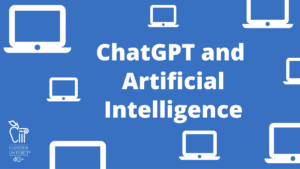ChatGPT is an AI language model developed by OpenAI, which has been trained on vast amounts of text data to generate human-like responses to questions and prompts. It is capable of producing coherent and meaningful answers on a variety of topics, ranging from current events to technical concepts. ChatGPT is part of a larger trend in AI content generation, which involves using machine learning algorithms to automatically produce written or spoken text.
The idea of AI content generation has significant impacts on the education field and society as a whole. In the education field, AI content generation can be used to produce personalized study materials, summaries, and assessments, which can help students learn more efficiently. Additionally, AI-generated content can be used to create virtual tutors or educational games, which can provide students with interactive and engaging learning experiences.
In society, AI content generation has the potential to revolutionize the way we consume and interact with information. For example, AI-generated news articles and summaries can help us stay informed about the latest developments in various fields, without having to spend hours reading long articles. Additionally, AI-generated content can be used to produce realistic customer support conversations, sales pitches, and even fiction, which can help businesses and individuals save time and resources.
However, it’s important to note that AI content generation also raises ethical and social issues, such as the accuracy and bias of generated content, the impact of AI-generated content on human jobs, and the potential for malicious actors to use AI to spread misinformation and propaganda. As AI technology continues to advance, it’s crucial that we consider these potential risks and take steps to mitigate them.
ChatGPT is a powerful AI language model that has the potential to transform the way we learn and interact with information. While AI content generation has many benefits, it also raises important ethical and social questions that must be addressed to ensure that this technology is used responsibly and for the benefit of society as a whole.
Note: This Week’s Current Event narrative was written by ChatGPT
This week’s Current Events resources examine the issues and opportunities surrounding the emerging public use of AI content generators. The resources shared provide information and context regarding AI content generators, their impacts on society at large and specifically in the education field.
Essential Questions, Vocabulary & Extend the Resources:
- What is an AI content generator and how does it work?
- How can AI content generators be used in the education field to enhance student learning?
- What are some of the potential benefits and risks of using AI content generators in society?
- How can AI content generators impact the job market and the way humans work in the future?
- What are the ethical and social implications of using AI content generators to produce news, information, and other types of content?
- In your opinion, what role should members of a society play in shaping the future of AI content generation?
- In your opinion, what role should the government play to mitigate the negative impacts of AI content generation?
Click here for a hardcopy of the Essential Questions and AI Content Generators Vocabulary
Click here for a hardcopy of Extension Activities CLP suggests implementing with this content
Videos:
Podcasts:
Generative AI: What’s all the hype about?, Make Me Smart, Marketplace, January 31, 2023
ChatGPT Tells All, The Lawfare Podcast, January 31, 2023
How will ChatGPT transform creative work?, Science Weekly, The Guardian, January 26, 2023
What Will ChatGPT Mean for Teaching?, The EdSurge Podcast, January 3, 2023
Background Resources:
The History of Artificial Intelligence, Harvard University
ChatGPT Isn’t the Only Way to Use AI in Education, Wired, January 26, 2023
Lesson Plan: Teaching and Learning in the Era of ChatGPT, The New York Times
Artificial Intelligence, Britannica
Blueprint for an AI Bill of Rights, The White House
Recent Articles:
A.I. Bots Can’t Report This Column. But They Can Improve It., The New York Times, February 1, 2023
A new AI chatbot might do your homework for you. But it’s still not an A+ student, OPB, NPR, December 19, 2022
These jobs are most likely to be replaced by ChatGPT and AI, Yahoo! Finance, February 1, 2023
ChatGPT Is Making Universities Rethink Plagiarism, Wired, January 30, 2023
Banning ChatGPT is the “Wrong Approach,” Khan Academy Founder Says at HGSE Webinar, The Harvard Crimson, January 26, 2023
‘This shouldn’t be a surprise’ The education community shares mixed reactions to ChatGPT, USA Today, January 30, 2023
Artists file class-action lawsuit saying AI artwork violates copyright laws, OPB, NPR, February 3, 2023
ChatGPT’s creator made a free tool for detecting AI-generated text, The Verge, January 31, 2023
Recent Editorials:
Don’t Ban ChatGPT in Schools. Teach With It., The New York Times, January 12, 2023
6 surprising facts about ChatGPT nobody told you, ComputerWorld, February 1, 2023
Guest Post: AI Will Augment, Not Replace, Inside Higher Ed, December 14, 2022
Writing without thinking? There’s a place for ChatGPT — if used properly , The Baltimore Sun, February 20, 2023
Lesson Plans:
How Does Technology Impact Your Life?, CS Matter
TED lesson plan: How AI can enhance our memory, work and social lives (Tom Gruber), Mark My Words
Explore Artificial Intelligence, Teachwire
The Automation Paradox | Braincraft, PBS Learning Media
School of the Future | What Should the School of the Future Look Like?, PBS Learning Media
AI bot ChatGPT shows academics essay-writing skills and usability, Newsela
Resources for Younger Students:
Happy or Sad? Exploring Bias in Machine Learning, Science Buddies
Technology – Its Benefits and Negative Effects, Discovery School

